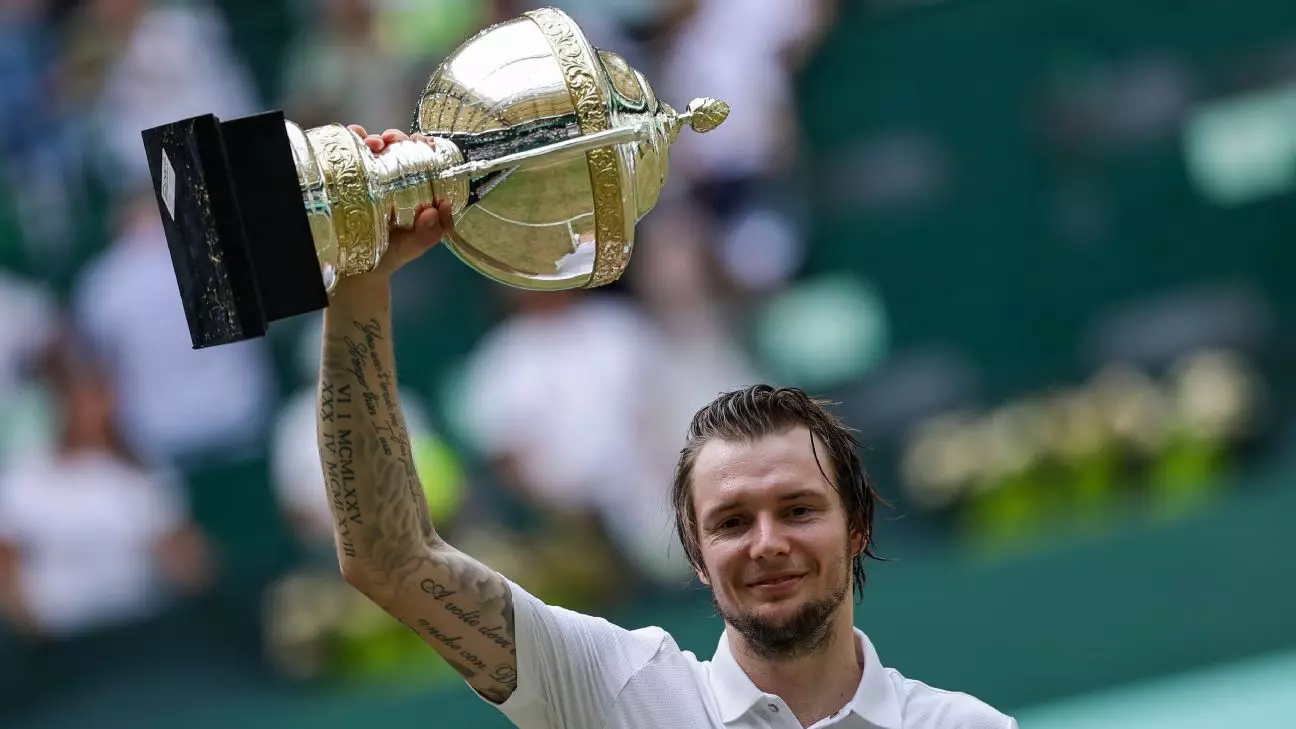In a remarkable display of talent and resilience, Alexander Bublik clinched the Halle Open title for the second time, marking a significant milestone in his career. His victory over Daniil Medvedev, with a score of 6-3, 7-6 (4), not only ends a six-match losing streak against the Russian but also positions Bublik as one of the few players to have won the title multiple times in the tournament’s storied history. This triumph sees Bublik joining an elite group, alongside legends like Yevgeny Kafelnikov and the iconic Roger Federer, asserting his place in the annals of grass-court tennis.
Bublik’s Mental Victory
Bublik’s post-match comments were steeped in humility and respect for Medvedev. The Kazakhstani athlete acknowledged his past failures against Medvedev, expressing a mix of relief and pride in his newly achieved success. To say that Bublik has had an uphill battle against Medvedev would be an understatement, yet his ability to overcome mental barriers spoke volumes about his growth as a player. “To win, to beat you here, it’s a privilege for me,” he stated, encapsulating the essence of sportsmanship amidst fierce competition. This historical win goes beyond numbers; it subtly indicates a maturing athlete, ready to take on the world.
Unforeseen Challenges and Tactical Brilliance
Although Bublik started strong, launching into a 12-point winning streak in the first set, his performance was not without its flaws. In the second set, the Kazakhstani player faced the daunting shadow of five double-faults, which could easily have unraveled a less poised athlete. However, he maintained his composure, capitalizing on Medvedev’s errors when it mattered most. The tense tiebreaker showcased not just Bublik’s fortitude but also strategic acumen, cleverly leveraging Medvedev’s backhand misfires to secure victory within 81 minutes. It was a masterclass in overcoming obstacles, reinforcing the notion that mental acuity often defines great players.
Medvedev’s Journey: A Reflection
While Bublik’s victory was undoubtedly the highlight, it’s worth examining Medvedev’s journey throughout the tournament. Having previously triumphed over local favorite Alexander Zverev in the semifinals, the Russian athlete was riding a wave of momentum, which makes his final match all the more poignant. Medvedev’s sentiments post-match revealed a mix of disappointment and acceptance – “A better week, maybe, than we expected but not the best feeling in the end.” His reflections highlight not just the intensity of competition at this level but also the psychological toll that accompanies elite sports.
The Evolution of Grass-Court Tennis
Bublik’s victory, sitting in the context of modern grass-court tennis, reflects an evolving landscape where power meets finesse. The Halle Open, renowned for its fast-paced games, continues to attract immense talent, showcasing players like Bublik who have adeptly adapted their games for grass surfaces. With players like him pushing boundaries, it raises the question of how future tournaments will be shaped and the benchmarks set by this new wave of competitors.
Ultimately, Bublik’s triumph is more than a trophy; it symbolizes a powerful narrative of persistence, growth, and respect within the realm of professional tennis. The specter of Daniil Medvedev’s formidable presence only adds to the narrative, showing that in sports, every setback can lead to a momentous comeback when fueled by determination and respect.

